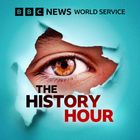
The History Hour
Apr 26, 2024
It’s been thirty years since the first fully democratic elections in South Africa, which saw the African National Congress take power in 1994.
But two years before that historic moment, white South Africans had to vote in a referendum that would decide whether or not to usher in a multi-racial government. We hear from President FW de Klerk’s then communications officer about how they helped “close the book on apartheid.”
Then we journey back to 1976 and hear about the Soweto Uprising, a student led protest against the enforced study of Afrikaans. Bongi Mkhabela who helped organise the peaceful march, tells us how it came to a bloody and tragic end.
Plus we take a look at the pivotal role played by women and girls in the lead up to the 1994 elections. Journalist and researcher Shanthini Naidoo tells us why women’s work and activism in the ANC is so often overlooked.
We hear from Oliver Tambo’s son about his father’s return to South Africa after 30 years in exile.
We also hear about the long overdue return of Sarah Baartman’s remains to South Africa, after over 190 years being kept in Europe, where she suffered horrific abuse while she was alive. This programme contains discriminatory language.
And finally, we learn about one of South Africa’s biggest popstars Brenda Fassie, from her friend, rival and admirer Yvonne Chaka Chaka.
Contributors: David Stewards – President FW de Klerk’s former communications advisor Bongi Mkhabela- Student organiser of the Soweto uprising Shanthini Naidoo- Journalist and researcher on women during apartheid Dali Tambo- Son of Oliver Tambo Diana Ferrus – Poet who helped bring Sarah Baartman home Yvonne Chaka Chaka- South African popstar
(Photo: Nelson Mandela after winning the election in 1994. Credit: Getty Images)

